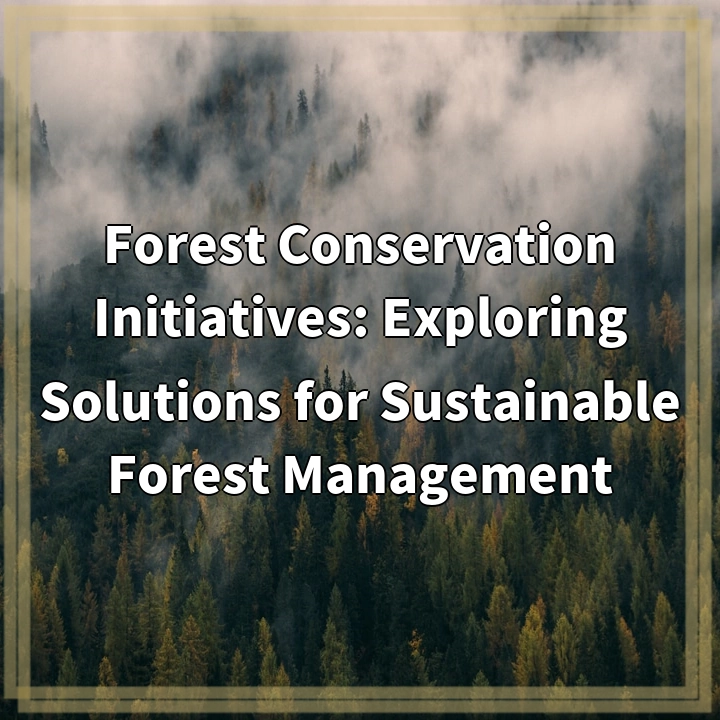Physical Address
304 North Cardinal St.
Dorchester Center, MA 02124
Physical Address
304 North Cardinal St.
Dorchester Center, MA 02124

Forest Conservation Initiatives: Exploring Solutions for Sustainable Forest Management
Forest conservation initiatives refer to the various efforts and strategies implemented to protect and sustainably manage forest ecosystems. These initiatives aim to preserve biodiversity, promote climate resilience, combat deforestation, and ensure the long-term health and productivity of forests.
1. Deforestation and Forest Degradation
One of the significant challenges faced by forest conservation initiatives is the ongoing issue of deforestation and forest degradation. Activities such as illegal logging, agricultural expansion, and infrastructure development pose a threat to the world’s forests. These practices result in the loss of habitat for numerous species, disruption of ecosystems, and contribute to greenhouse gas emissions.
2. Unsustainable Logging and Exploitation
Unsustainable logging practices, including illegal and unregulated logging, contribute to the degradation of forest ecosystems. Overharvesting of commercially valuable tree species can lead to biodiversity loss, soil erosion, and the destruction of important habitats. Moreover, the exploitation of forests for their resources without proper management and replenishment can deplete the natural resources on which both local communities and larger ecosystems depend.
3. Lack of Effective Governance and Law Enforcement
The lack of effective governance and law enforcement poses a significant challenge to forest conservation initiatives. Insufficient regulation and enforcement allow illegal activities such as logging, land encroachment, and poaching to persist. Weak governance structures and corruption hinder efforts to combat these issues and protect forests effectively.
4. Land Conversion and Fragmentation
As global populations and demands for agricultural land increase, forests are often converted into agricultural fields or plantations. This conversion leads to habitat loss, decreased biodiversity, and fragmentation of forest ecosystems. Fragmented forests are more vulnerable to invasive species, increased fire risks, and reduced connectivity, creating challenges for conservationists to maintain the integrity of forest landscapes.
5. Climate Change and Forest Resilience
Climate change poses a significant threat to forest ecosystems. Rising temperatures, changing rainfall patterns, and increased frequency of extreme weather events affect the health and resilience of forests. Forest conservation initiatives face the multiple challenges of mitigating climate change impacts, adapting forest management practices to changing conditions, and identifying resilient species and strategies to ensure the future survival of forests.
6. Socioeconomic Pressures and Poverty
In many regions, poverty and socioeconomic pressures drive unsustainable practices that contribute to the degradation of forests. Local communities may rely on forest resources for their livelihoods, leading to forest exploitation out of necessity rather than choice. Addressing these underlying socioeconomic issues and providing alternative, sustainable livelihood options is crucial for the success of forest conservation initiatives.
1. Implementing Stronger Regulations and Law Enforcement
Strengthening regulations and law enforcement mechanisms can help combat deforestation, illegal logging, and unsustainable practices. This includes stricter penalties for offenders, improved monitoring systems, and increased collaboration between government agencies, local communities, and non-governmental organizations.
2. Promoting Sustainable Logging Practices
Encouraging sustainable logging practices, such as selective logging and reduced-impact logging, can minimize the ecological impact of timber extraction while ensuring the long-term viability of forests. Certifications and eco-labeling systems can provide incentives for companies to adopt sustainable practices.
3. Supporting Community-Based Forest Management
Involving local communities in the management and decision-making processes can promote sustainable practices and empower communities to protect their forests. Recognizing and supporting community land rights and providing access to alternative livelihood options can reduce pressure on forests and enhance conservation efforts.
4. Encouraging Forest Landscape Restoration
Implementing large-scale forest landscape restoration initiatives can help restore degraded forests, promote biodiversity, and enhance ecosystem services. This includes reforestation, afforestation, and the restoration of degraded lands through the establishment of diverse and resilient forest ecosystems.
5. Promoting Payment for Ecosystem Services
Establishing systems where individuals or entities financially contribute to ecosystem preservation can provide economic incentives for forest conservation. Payment for ecosystem services models can compensate landowners and communities for maintaining or restoring forest ecosystems, emphasizing the value of forests for providing clean water, carbon sequestration, and habitat preservation.
6. Enhancing Climate Change Adaptation and Mitigation
Addressing climate change impacts on forests requires both adaptation and mitigation strategies. This includes implementing measures to enhance forest resilience to changing climatic conditions, such as promoting biodiversity, managing forest fires, and reducing vulnerability to pests and diseases. Simultaneously, efforts to reduce greenhouse gas emissions should be prioritized through sustainable forest management, carbon storage initiatives, and reducing deforestation and forest degradation.
By implementing these and other innovative solutions, sustainable forest management practices can be fostered, leading to the conservation and protection of our precious forest ecosystems.
Forest Conservation Initiatives
If you’re wondering where the article came from!
#